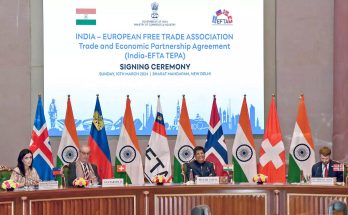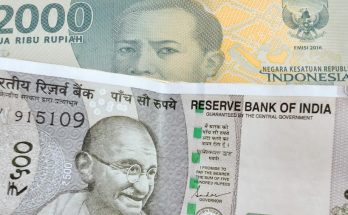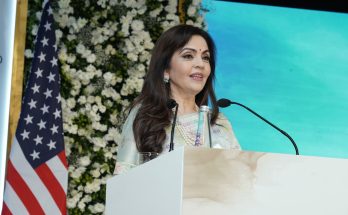Amid renewed global spotlight on the ease of doing business in India, Prime Minister Narendra Modi has underlined his commitment to carry forward his ‘Reform to Transform’ agenda and raised the bar for reform of global economic governance institutions.
“My agenda for reform to transform is yet to be finished,” Mr Modi said at the ‘Advancing Asia’ conference in New Delhi on March 12. Speaking at the summit, hosted by the government and the International Monetary Fund (IMF), Mr Modi said that India has dispelled the myth that democracy and rapid economic growth cannot go together.
India & Asia: Linked Destinies
Alluding to the linked destinies of India and Asia, Mr Modi eloquently spoke about his dream of a Transformed India. “I lay this dream alongside our common dream of an Advanced Asia – an Asia where more than half of the global population can live with happiness and fulfillment. Our joint heritage and mutual respect, our common goals and similar policies, can and must create sustainable growth and shared prosperity.”
‘Asia a ray of hope’
Cheerleading for an emerging Asian century, Mr Modi spoke about the ongoing economic vibrancy in the Asian hemisphere. “Three out of every five people in the world live in Asia. Its share in global output and trade is now close to one-third. Its share in global foreign direct investment is about forty percent. It has also been one of the world’s most dynamic regions.” The Indian leader underscored that Asia is “the ray of hope for global economic recovery.”
Reforming IMF and World Bank
Mr Modi also sought to raise the bar for spurring reform of global financial institutions. He welcomed the recent quota changes to reflect the growing economic muscle of emerging economies, but stressed that more needs to be done to make these global institutions reflect the shift of power from the west to the rest. Lauding IMF Managing Director Christine Lagarde, Mr Modi said reform of global institutions such as the World Bank and the IMF has to be an on-going process. But even now they don’t reflect the global economics realities.
“Change in quotas is not an issue of increasing the ‘power’ of certain countries. It is an issue of fairness and legitimacy. The belief that quotas can be changed, is essential for the fairness of the system. For poor nations to respect the legitimacy of such institutions, they must be able to aspire and to hope. I am very happy that the IMF has decided to finalise the next round of quota changes by October 2017,” Mr Modi said
Taking a jibe at China, Mr Modi said, “We have never tried to gain in trade at the expense of our partners. We do not follow “beggar thy neighbour” macro-economic policies. We have never undervalued our exchange rate.”
Talking about India’s cooperative initiatives in Asia he said: “We are transforming the ‘Look East Policy’, into an ‘Act East Policy. Our approach to cooperation is based on flexible geometry. We have integrated in different ways and at different speeds with our neighbours in South Asia, our partners in ASEAN, and our partners in Singapore, Japan, and Korea”.
Having assumed the mantle of India’s preeminent salesman, the Indian leader held aloft the growing Indian economy as a beacon amid the festering global slowdown.
“We all want Asia to succeed. I firmly believe that India can contribute to Asian prosperity and development by being economically strong. Amid global problems, I am happy to say that India is a haven of macro-economic stability and a beacon of hope, dynamism and opportunity.”
The prime minister said that along with the focus on macro-economic stability, there is now improved economic governance. He also added that corruption and interference in the decisions of banks and regulators are now behind us.
(Balendu Shekhar contributed inputs for this article)
Author Profile
- India Writes Network (www.indiawrites.org) is an emerging think tank and a media-publishing company focused on international affairs & the India Story. Centre for Global India Insights is the research arm of India Writes Network. To subscribe to India and the World, write to editor@indiawrites.org. A venture of TGII Media Private Limited, a leading media, publishing and consultancy company, IWN has carved a niche for balanced and exhaustive reporting and analysis of international affairs. Eminent personalities, politicians, diplomats, authors, strategy gurus and news-makers have contributed to India Writes Network, as also “India and the World,” a magazine focused on global affairs.
Latest entries
 In ConversationJuly 26, 2024India-Italy defence collaboration can extend to third countries: Anil Wadhwa
In ConversationJuly 26, 2024India-Italy defence collaboration can extend to third countries: Anil Wadhwa In ConversationJuly 23, 2024Italy views India as a key partner in Indo-Pacific: Vani Rao
In ConversationJuly 23, 2024Italy views India as a key partner in Indo-Pacific: Vani Rao DiplomacyJune 29, 2024First BRICS unveils a roadmap for boosting tourism among emerging economies
DiplomacyJune 29, 2024First BRICS unveils a roadmap for boosting tourism among emerging economies India and the WorldJune 11, 2024On Day 1, Jaishankar focuses on resolving standoff with China
India and the WorldJune 11, 2024On Day 1, Jaishankar focuses on resolving standoff with China







